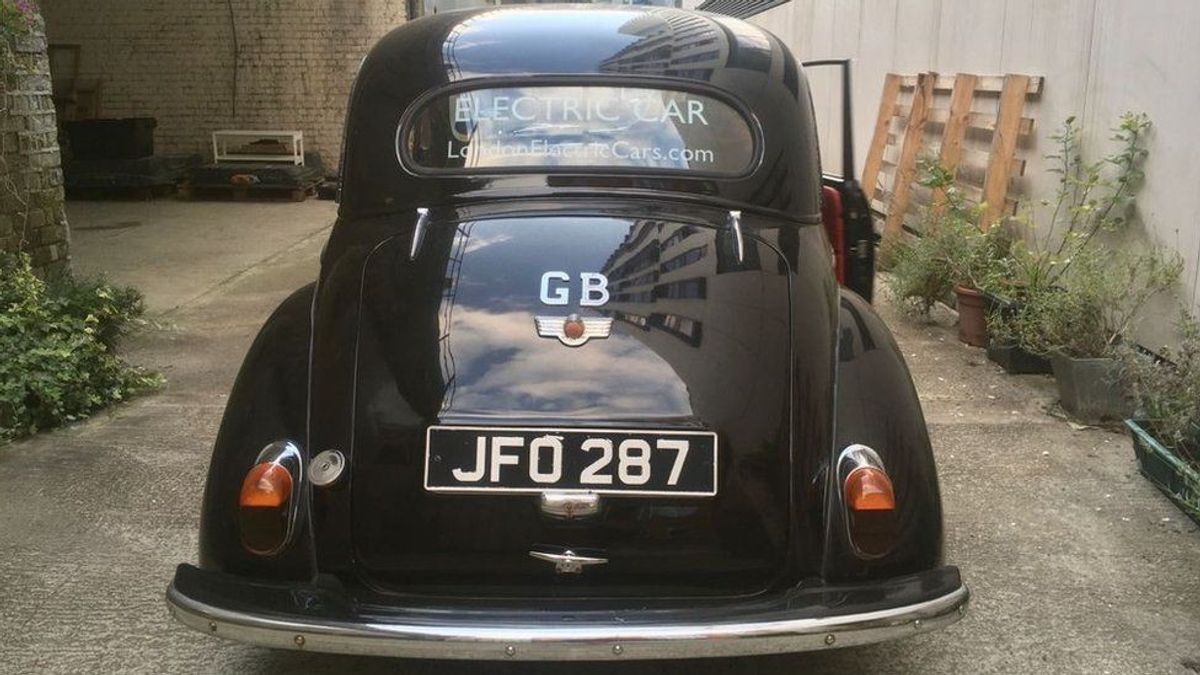JAKARTA - Oswald is a black Morris Minor 1953. But he sounded soft after his fossil fuel-drinking heart was now replaced with a recycled electric motor.
Previously, the 68-year-old car's gasoline engine would mask most of the other noise! But driving beside the River Thames in London all you can hear is a few creaks, and the roar of motorbikes and other traffic passing by. The image of electric vehicles (EVs) as sleek and futuristic vehicles has changed.
Oswald is owned by a man named Matthew Quitter, who is on a mission to help save an old gasoline “drinker” from a pile of garbage, and turn it into a battery-powered car. Quitter founded a company called London Electric Cars in 2017.
Working in a garage under a railroad arch in Vauxhall, the company replaced the combustion engines in classic cars with electric motors and batteries that would otherwise have been thrown away.
These parts usually come from crashed EVs, such as Tesla and Nissan Leafs, which have been written off by insurance companies but have undamaged motors and batteries. "We are the ultimate recycler," Quitter was quoted as saying by the BBC.
The company currently charges around £20,000 per conversion, so it's not cheap. But the company said it wanted to lower that fee to £5,000 to make it affordable for more people.
While the UK government is currently offering a grant of 2,500 pounds (Rp48 million) for the cost of buying a new EV. Quitter said they should also consider introducing grants for conversions.
"It's a disaster to squander millions of old cars [petrol and diesel] on our roads, and the government's EV price cuts are encouraging wastage," he said.
"The government needs to offer affordable conversions to cheap old cars, to take advantage of used EV batteries - which have raw materials whose prices are still skyrocketing," he added.
Steve Drummond, who runs another company that turns old cars into electric power - Oxford-based Electrogenic - agrees.
"The incentive is to buy a new EV, but that throws the whole car away when you can just replace the engine," he said.
A Department of Transport spokesman said it was looking into the matter: "Retrofitting vehicles with batteries is a growing market, and we are working with green travel researchers."
Meanwhile, classic cars converted to electric do come with some financial incentives. Like all classic cars (currently classified in the UK as made before January 8, 1981), they are exempt from road tax if not used for commercial purposes.
Plus, classic car insurance is usually cheap, at least if the vehicle doesn't do a lot of mileage. However, rates could rise sharply if users tell insurance providers that there's now a Tesla engine under the hood that has made the vehicle significantly faster.
To be sure, turning an old car into electricity produces less carbon dioxide (CO2) than making a new electric car.
The UK government-funded Zemo Partnership (formerly known as the UK Low Carbon Vehicle Partnership) says that a new electric car typically produces 18 tonnes of CO2 over its lifetime, 46% of which comes while it is being produced. This compares to 24 tons for a standard gasoline vehicle.
Quitter says it can take between three and six months for the conversion to take place, based on whether he has previous experience converting certain cars and models, and the complexity of customer wants and specifications.
Oswald now has a range of 40 miles, which Quitter says is about a week of driving in London and costs £1 to charge.
He added, however, that some classic cars are better suited to electric conversions than others. Aston Martin appears to be challenging because of its light and agile nature "not yet done electric", while Bentley and Rolls-Royce are "made to be electric because they are made to drive smoothly".
Meanwhile, Jaguar customers with older versions of the open-top roof are said to prefer electric because they no longer have to "walk around in their smog".
At Electrogenic, Mr Drummond says old Minis and Land Rovers are the cheapest classic cars to convert.
Drummond says one of the most exciting projects he has worked on so far is creating the first version of a Morgan sports car to convert to electricity. His company is now turning all of Glastonbury's Festival Land Rovers into electric power.
He added that if his Triumph TR8's four-liter engine were converted to electric, it would "turn the fire-breathing, roaring monster that amazed everyone, into a rattling, breezy old car."
The English, Chinese, Japanese, Arabic, and French versions are automatically generated by the AI. So there may still be inaccuracies in translating, please always see Indonesian as our main language. (system supported by DigitalSiber.id)













